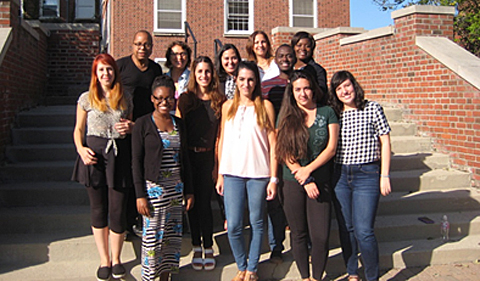
Graduate students attend Reimagining the Spanish Comedia in the Transmedia Age.
Several graduate students from Ohio University participated in the symposium “Reimagining the Spanish Comedia in the Transmedia Age,” which explored new ways of examining Hispanic classical theater in order to make it more relevant to college students and other audiences in the United States.
As the conference, hosted by Ohio Wesleyan and Denison universities on Sept. 23 and 24, students attended a theater production by the Spanish company Morfeo Teatro and a theater workshop by Francisco Plaza, director of the Teatro de Rojas in Toledo, Spain.
The students are enrolled in a graduate seminar in the Modern Languages Department that studies the representation of different ethnic groups in the Spanish theater during the 16th and 17th centuries.
“This has been a great opportunity for our students,” says Dr. Melissa Figueroa, Assistant Professor of Spanish, who teaches the course. “The symposium allowed them to be part of a discussion about the digital humanities, adaptations, translations, and new pedagogical approaches to teaching the Spanish comedia. I am extremely grateful for the invitation of the organizers, Dr. Glenda Y. Nieto-Cuebas (Ohio Wesleyan University) and Dr. Francisco López-Martín (Denison University). I am also grateful to the department chair, Dr. Betsy Partyka, who supported this initiative and gave us a lot of encouragement during the process. Finally, I would like to thank Dr. Nelson Hippolyte, Dr. Mary Jane Kelley, Liliana Álvarez, and Shelley Barton for making this educational trip possible.”
“This activity reflects the commitment of the Department of Modern Languages to enhancing student learning experiences in critical, creative and practical ways outside the classroom,” Partyka says. “This sort of activity, initiated by Dr. Figueroa, is very inspirational to both faculty and students. Not only is the academic aspect of viewing a play and experiencing an intensive workshop intellectually stimulating, but students begin to understand the beauty of higher education where curiosity and questions are rewarded.”
Dr. Mary Jane Kelley, Associate Professor of Spanish, adds, “I found this event richly stimulating, for both my teaching and my research. The small size of 30 or so participants led to lively dialogue on themes related to studying classical Spanish theater as well as bringing it alive in the classroom.”
Students’ Perspectives
“I truly enjoyed the Spanish play at Ohio Wesleyan University and the workshops at Denison University,” says Hadassah Petit-De, a graduate student from the United States. “It was very exciting to see a Spanish play in the U.S., since it was my first experience. I appreciated the fact that I was able to interact with other students interested in Spanish theater and plays. We discussed ways in which digital humanities can be applied to our classrooms and also different approaches when presenting plays to students. It was very interesting to see how I could use authentic plays in beginner-level Spanish course and in higher levels as well. I would love to do this again.”
Andrea Correal García, a graduate student from Spain, says, “I found the conference very useful and interesting. I have always loved theater—watching it, performing it and talking about it, so this conference as a whole was a great experience.”
“It was an extremely enriching experience professionally, but also personally, and I most definitely participate again in such an event. The organization was flawless and it was an amazing opportunity to be able to discuss different topics of our fields with various professors and experts,” says Irene Soto Lucena, another graduate student from Spain.
Carla Consolini, a graduate student from Argentina, says “Reimagining the Spanish comedia was one of the most relevant events I have attended as a student. Seeing such a marvelous performance work and being able to discuss it, along with further ideas on the topic, with colleagues from different universities was an amazing learning opportunity.”



















Comments